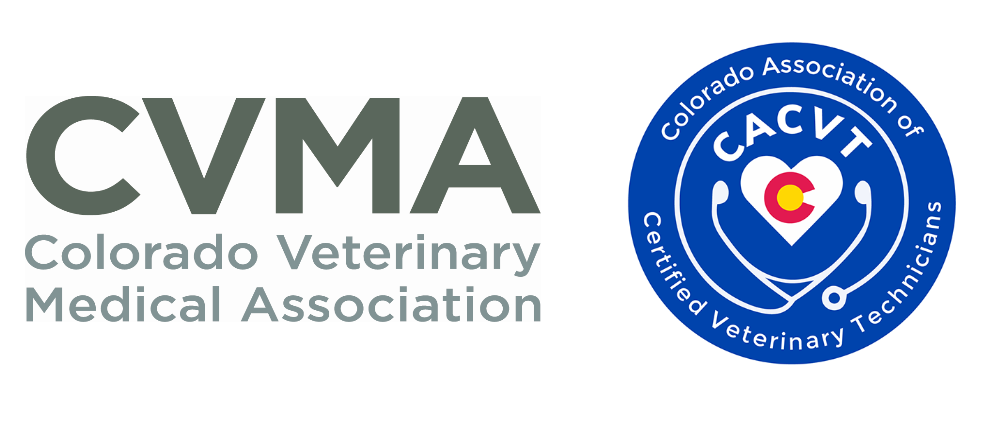
01 Dec Veterinary technician regulation in Colorado…what does it mean for your team?
Beginning January 1, 2023, veterinary technicians in Colorado will be regulated by the Department of Regulatory Agencies (DORA) as a result of a 2022 legislative bill that revised the Colorado Veterinary Practice Act and included a provision for regulation of veterinary technicians.
On December 2, 2022, DORA distributed an email announcing that applications are now available for veterinary technician and provisional veterinary technician registration.
CVMA and the Colorado Association of Certified Veterinary Technicians (CACVT) have worked jointly since late 2020 to provide for regulation of veterinary technicians as part of the renewal of the Colorado Veterinary Practice Act.
Looking for comprehensive information on the registration process for technicians? Click here to visit the CACVT website.
What does registration mean for technicians and veterinary practices?
The most important joint goal for regulation of veterinary technicians has been to retain everyone now working as a veterinary technician in Colorado and to provide inclusive opportunities for regulation. To learn more about the goals of technician regulation in Colorado, please read this article.
Veterinary technicians in Colorado previously could hold a certification, but this new registration codifies the profession in statute and creates a new profession under state law.
The biggest notable change is that veterinary technicians will have title protection, meaning that only those who are registered with DORA as a veterinary technician can use the title veterinary technician.
Technicians who are not interested in registration will still be able to continue doing their job. There is no task restriction for anyone, so they will be able to continue working in their current roles but will not be able to use the title “veterinary technician.”
Click the image below to explore the CACVT Credentialing Process Flow Sheet.
When do these changes take effect?
There is no requirement to register until January 1, 2024, but qualified individuals may be issued a registration prior to that date.
Anyone practicing as a veterinary technician must be registered by the Colorado State Board of Veterinary Medicine by January 1, 2024. Only a person registered as a veterinary technician will have the ability to use the titles “veterinary technician” or “registered veterinary technician” or the initials “VT” or “RVT” on or after January 1, 2024.
Provisional veterinary technician registrations will no longer be renewable after January 1, 2028.
In addition, two registered veterinary technicians will be appointed by the governor to serve on the State Board of Veterinary Medicine in 2023 along with the already-serving five veterinarians and two public members that comprise the board.
What organization will be responsible for credentialing technicians?
CACVT has been approved by the State Board of Veterinary Medicine as the credentialing entity in Colorado. CACVT will verify that the applicant has the required qualifications for registration
Applicants should apply directly with CACVT and, once credentialed, will need to submit: A completed application to the Colorado Department of Regulatory Agencies, Division of Professions and Occupations (DPO); the required fee for registration approval; and verification that the applicant holds a current credential from CACVT.
Those persons not yet credentialed who have been practicing as a veterinary technician but do not meet the registration requirements will have the opportunity to obtain a provisional registration through DPO, subject to all laws, rules, and policies of the State Board of Veterinary Medicine. These individuals will eventually need to obtain a full credential through CACVT prior to expiration of the provisional registration.
How do technicians become registered?
The details of the registration process were created by DORA during the rulemaking process in the fall of 2022.
- Current CVTs: Credentialed veterinary technicians who just renewed with CACVT are qualified to apply for registration with DORA.
- Non-credentialed individuals who have been working in the role of a veterinary technician for at least 6500 hours: You will be eligible to apply for a credential with CACVT as soon as the experience-based pathway application becomes available. You will have until 12/31/23 to obtain your credential and then apply for registration with DORA.
- Non-credentialed individuals who haven’t been working in the role of a veterinary technician for at least 6500 hours: You will need to apply for a provisional registration from DORA by 12/31/23. Once you complete the requirements of one of the experience-based pathways, you will have 28 days to apply for a credential with CACVT.
Why CVMA’s advocacy work is important
One of the most essential and impactful services that CVMA provides on behalf of members is advocating on behalf of Colorado’s veterinary profession in before various legislative and regulatory groups. This work is empowered by the strength of 2,600+ CVMA members standing alongside us, and it is funded exclusively by your annual membership dues. Your commitment to CVMA means that we can effectively work at many levels to protect you, your practice, and the veterinary profession in Colorado. We consistently ensure that legislators know how proposed bills can help or hurt your livelihood, veterinary medicine, and animal health and welfare. No one else will do this work for the Colorado veterinary profession. This effort requires continual attention and action and it can only be accomplished when we come together as a single, unified voice. Together, we protect veterinary medicine.
Encourage your friends and colleagues to join CVMA. Empower the CVMA Political Action Committee with your contribution.



